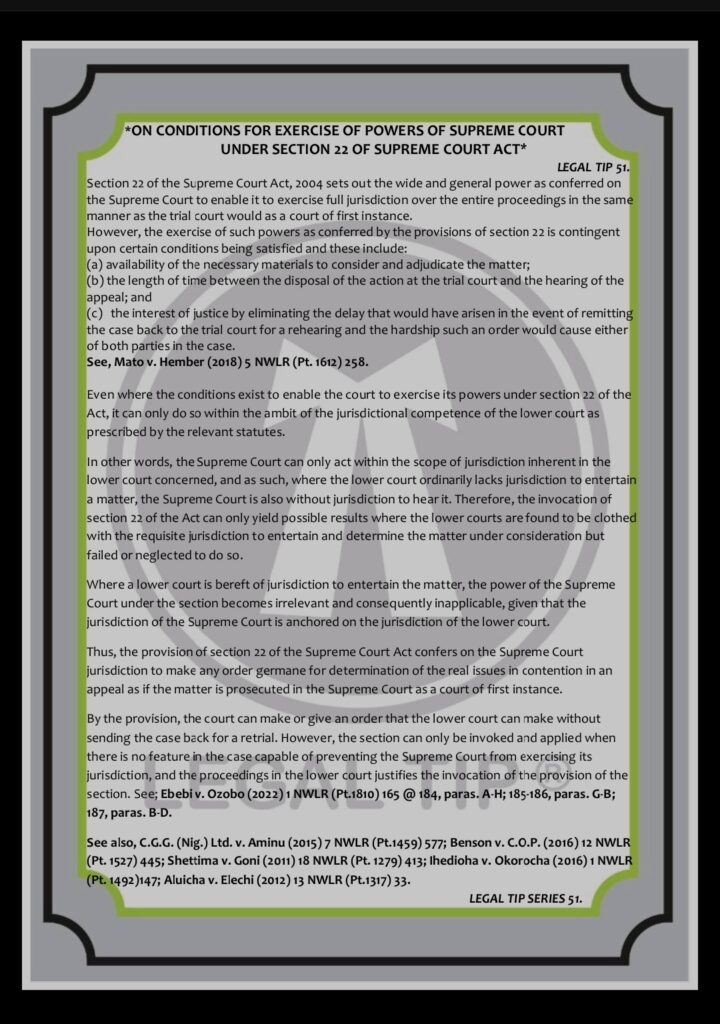Section 22 of the Supreme Court Act, 2004 sets out the wide and general power as conferred on the Supreme Court to enable it to exercise full jurisdiction over the entire proceedings in the same manner as the trial court would as a court of first instance.
However, the exercise of such powers as conferred by the provisions of section 22 is contingent upon certain conditions being satisfied and these include:
(a) availability of the necessary materials to consider and adjudicate the matter;
(b) the length of time between the disposal of the action at the trial court and the hearing of the appeal; and
(c) the interest of justice by eliminating the delay that would have arisen in the event of remitting the case back to the trial court for a rehearing and the hardship such an order would cause either of both parties in the case.
See, Mato v. Hember (2018) 5 NWLR (Pt. 1612) 258.
Even where the conditions exist to enable the court to exercise its powers under section 22 of the Act, it can only do so within the ambit of the jurisdictional competence of the lower court as prescribed by the relevant statutes.
In other words, the Supreme Court can only act within the scope of jurisdiction inherent in the lower court concerned, and as such, where the lower court ordinarily lacks jurisdiction to entertain a matter, the Supreme Court is also without jurisdiction to hear it. Therefore, the invocation of section 22 of the Act can only yield possible results where the lower courts are found to be clothed with the requisite jurisdiction to entertain and determine the matter under consideration but failed or neglected to do so.
Where a lower court is bereft of jurisdiction to entertain the matter, the power of the Supreme Court under the section becomes irrelevant and consequently inapplicable, given that the jurisdiction of the Supreme Court is anchored on the jurisdiction of the lower court.
Thus, the provision of section 22 of the Supreme Court Act confers on the Supreme Court jurisdiction to make any order germane for determination of the real issues in contention in an appeal as if the matter is prosecuted in the Supreme Court as a court of first instance.

By the provision, the court can make or give an order that the lower court can make without sending the case back for a retrial. However, the section can only be invoked and applied when there is no feature in the case capable of preventing the Supreme Court from exercising its jurisdiction, and the proceedings in the lower court justifies the invocation of the provision of the section. See; Ebebi v. Ozobo (2022) 1 NWLR (Pt.1810) 165 @ 184, paras. A-H; 185-186, paras. G-B; 187, paras. B-D.
See also, C.G.G. (Nig.) Ltd. v. Aminu (2015) 7 NWLR (Pt.1459) 577; Benson v. C.O.P. (2016) 12 NWLR (Pt. 1527) 445; Shettima v. Goni (2011) 18 NWLR (Pt. 1279) 413; Ihedioha v. Okorocha (2016) 1 NWLR (Pt. 1492)147; Aluicha v. Elechi (2012) 13 NWLR (Pt.1317) 33.
LEGAL TIPS is anchored by Ms CIA Ofoegbunam, an Abuja-based lawyer who is passionate about legal practice.LEGAL TIPS offers quick hints on substantive law, as well as rules of practice and procedure, and serves as a handy reference guide to lawyers, especially in court.Published on a weekly basis, the LEGAL TIPS Series is CIA’s modest contribution to legal development in Nigeria



